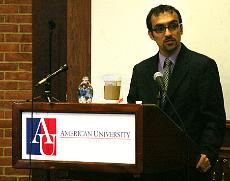AU's Center for Global Peace

Iraqis react to guilty verdict
Kate Winston
Issue date: 11/9/06
The timing of Saddam Hussein's death sentence was a blow to the independence of Iraqi courts, said Bilal Wahab, an Iraqi Fulbright scholar and AU graduate student.
Wahab and fellow Iraqi Fulbright scholar Zina Abdul Latif spoke Monday at a forum sponsored by the School of International Service and Center for Global Peace. AU students attended the forum on Monday to learn how young people in Iraq are reacting to the conflict there.
Hussein's death sentence came two days before the U.S. midterm elections, linking it more closely to events in the United States than events in Iraq, he said. The ruling could have been released two weeks ago, he said.
"I feel bad as an Iraqi Kurd that my country and the blood of my people has become a political debate of winning an election rather than finding a solution," he said.
However, the United States was right to remove Saddam and should not yet withdraw from the country, said Wahab and fellow Iraqi Fulbright scholar and AU student Zina Abdul Latif.
"I think I feel the American pain when they say 'We need to pull out from Iraq,'" Latif said.
Yet for every U.S. soldier who dies, 100 Iraqis die in return, she said.
Latif's voice shook as she said her brother, 22, was killed on his graduation day in June 2005.
The current cycle of sectarian violence was caused by terrorists, but it continues because of militias, ethnic tension, police corruption and mistaken U.S. policy, Wahab said.
"I am embarrassed, as a supporter of the war, that there is some sort of a civil war in Iraq and Americans say out loud, 'It's not our war,'" Wahab said. "Then why are you there?"
Neighboring countries that do not want a U.S. ally in the region continue to fund the violence, Latif said. U.S. troops should stay in the region until the Iraqi police can overcome corruption and quell the violence, she said.
Unfortunately, militias are being tolerated and insurgents are getting the profit, Wahab said.
"If you want to do business, if you want to make money, either join a militia, join an organized group or become a terrorist," he said.
A Kurdish member of an Iraqi federalist state is preferable to an independent Kurdish state surrounded by enemies, Wahab said. Instead, Iraq should try to create a national identity, he said.
"We should heal this Iraq instead of creating a new animal," he said.
Irene Colthurst, a junior in the School of International Service and the School of Public Affairs, said she has a concentration in Middle Eastern studies and she attended the forum to gain the perspective of a fellow scholar.
Andrew Engel, a sophomore in SIS and SPA, agreed.
"I wanted to see the human, personal element to this," he said.

0 Comments:
Post a Comment
Subscribe to Post Comments [Atom]
<< Home